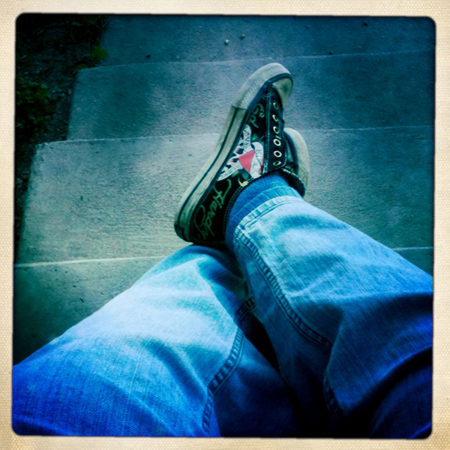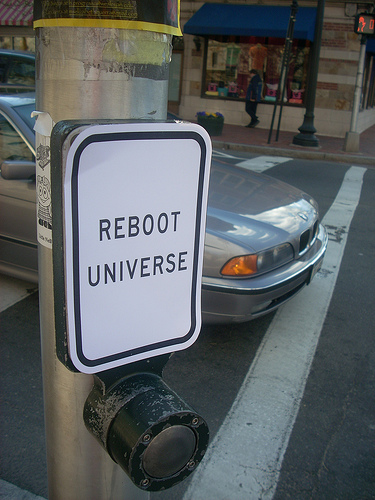
Author and fellow Codex member Elaine Isaak posed this question:
So as I was tossing and turning last night, it occured to me that the one area where I’m not sure I *can* effectively apply my willpower is in getting a good night’s sleep. I can’t WILL myself to sleep the way I might will myself to get up on time to start writing or to go to the gym. I wondered if you have come across any research that tackles this, or have any tools to suggest?
I have to agree with Elaine on not being able to will ourselves to sleep by sheer determination, but fortunately I do know of a number of ways to get to sleep and to sleep better, based on research. Understanding that serious problems with insomnia are worth seeing a doctor about and that these recommendations are not professional medical or psychological advice … here they are:
Long-Term Habits
1. Plan your schedule so that you can get to sleep at a decent hour and still be able to wake up if you want to. If there are things you need to do before going to bed, do them earlier in the evening to make sure they don’t push your bedtime back.
2. Figure out how much sleep you actually need by keeping track of how much sleep you’re getting each day and whether that turned out to be enough. This may change over time, or under different circumstances (such as in stressful periods or with more or less exercise).
3. Get on a steady schedule with your sleeping hours. Staying up late on weekends or going to bed at different times every night, for instance, can sometims interfere with your body’s attempts to establish a natural sleep schedule.
4. You may need to make your bed an environment you associate mainly with sleeping (and, if appropriate, sex). Take activities like reading, using a laptop computer, or watching TV out of bed if your bed doesn’t feel like a place that naturally relaxes you.
5. On mornings when you don’t have to get up right away, if any, don’t sleep in for long periods, as this may tend to muck with your ability to sleep that night. More sleep isn’t always better.
6. Take steps to make sure you have the physical comfort you need, to the best of your ability: a firm, comfortable mattress; good ventilation; a comfortable temperature; etc. For me, one of the most relaxing features of my bedroom in summer is a fan pointed at the bed. You may also find it more comfortable to use a non-illuminated bedroom clock, although this is admittedly inconvenient if you are up in the middle of the night and want to know what time it is.
Daily Habits
7. Watch out for caffeine and consider cutting it out for a little while if you’re having sleep problems. Remember that in addition to regular coffee, most sodas, black/green/white tea, and chocolate contain caffeine, and that even decaf coffee and decaf tea contain some caffeine–just a reduced amount. Other stimulants to be careful of include ginseng and nicotine.
8. Exercise during the day! Be active! Regular exercise contributes to very good sleep.
9. Watch out for alcohol: while it can help you fall asleep more quickly, it also can cause sleep problems. According to MayoClinic.com, “it prevents deeper stages of sleep and often causes you to awaken in the middle of the night.”
10. Don’t eat or drink a lot late in the evening. Either can cause physical discomfort that keeps you up at night or that can interrupt an otherwise sound sleep.
Before bed
11. Stretch, either doing yoga or basic stretching techniques. Stretching will release tension and improve blood flow.
12. Before bed, steer clear of things that might stir you up, like watching television, reading a suspenseful novel, or taking on stressful tasks. Relaxing activities will help settle you down so that you can sleep more easily. These can even include things like picking up and cleaning around the house to set things in order, or gathering things you’ll need the next day. The relative mindlessness of these tasks, the mild physical activity, and the way this prevents you from having to worry about getting things done in the morning are all conducive to good sleep.
13. Consider meditation, for instance body scan meditation, in which you focus your attention on each part of your body in turn and allow it to relax. Meditation can help still mental chatter and create a serene state of mind.
14. Ask a romantic partner, family member, or friend to give you a massage in the evening. This is an excellent means to rope someone into giving you a free massage, so don’t miss out.
In the moment
15. If you find yourself kept up by specific worries or general anxiety, try idea repair, journaling, or talking things out with someone who cares about how you’re doing.
16. Soft earplugs are great if you’re having trouble with noise. There’s a picture of the kind I like in this post.
17. If you’re obsessing about making yourself sleep, you may want to get out of bed, go sit on the couch, and read a book or listen to music or watch a movie that you’ve already seen, turned down low. These kinds of activities can engage your attention in a more relaxed way that may allow you to fall asleep more easily. Just make sure to have a comfortable couch.
18. In bed, listen to low music or a relaxation CD. Like the tactics mentioned in the previous item, this can help relax you when your mind is overstimulated.
Photo by babblingdweeb
Like this:
Like Loading...











